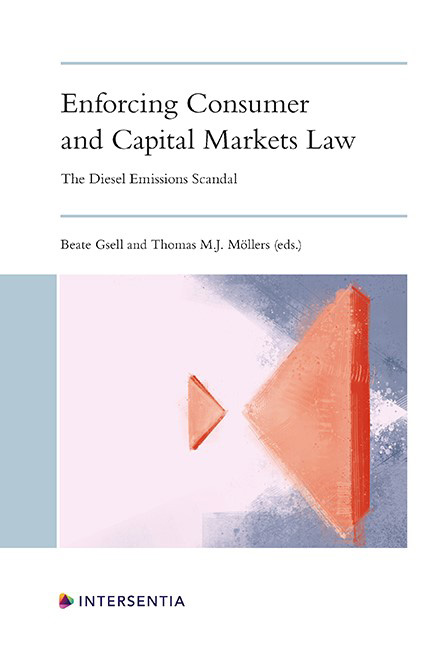Book contents
- Frontmatter
- Acknowledgement
- Contents
- List of Cases
- List of Abbreviations
- List of Contributors
- PART I INTRODUCTION
- PART II EUROPE
- PART II BEYOND EUROPE
- PART III THE SUPRANATIONAL PERSPECTIVE
- PART IV LEGAL PRACTICE PERSPECTIVE
- PART V INTRADISCIPLINARY ANALYSIS AND REFORM RECOMMENDATIONS
- Key Source Bibliography
- Index
- About the Editors
Enforcing Consumer and Capital Markets Law in the Netherlands
Published online by Cambridge University Press: 22 December 2020
- Frontmatter
- Acknowledgement
- Contents
- List of Cases
- List of Abbreviations
- List of Contributors
- PART I INTRODUCTION
- PART II EUROPE
- PART II BEYOND EUROPE
- PART III THE SUPRANATIONAL PERSPECTIVE
- PART IV LEGAL PRACTICE PERSPECTIVE
- PART V INTRADISCIPLINARY ANALYSIS AND REFORM RECOMMENDATIONS
- Key Source Bibliography
- Index
- About the Editors
Summary
PUBLIC LAW
CONSUMER LAW (CASE 1)
Do Eliminations of Consequences, Damages and Skimming of Profits (by Fines) Exist?
The 2006 Wet handhaving consumentenbescherming (Act on Consumer Protection Enforcement) brought the Dutch consumer authority into existence. This authority merged with the Competition Authority in 2013 and now goes by the name of the Netherlands Authority for Consumers and Markets (ACM).
Under public law, the abovementioned sanctions do not exist. However, the ACM may impose fines for violations committed by traders. When setting the amount of the fine, it has to take into account ‘the infringing trader's turnover, net profit as well as any fines imposed for the same infringement in other Member States’. The exact amount of the fine depends on the seriousness and the duration of the violation, and on the specific circumstances of the case. If there have been repeat offences or if the investigation has been obstructed, the fine may be set higher. On the other hand, fines may also be lowered, for example if the aggrieved parties were compensated by the infringers. The fine must be proportional to the violation of the law but it must also have a sufficiently deterrent effect, not just on the infringer himself, but also on other companies. Fines are therefore published on the website of the ACM. The maximum fines were raised in 2014 – fines can now be as high as €900,000 or 10 per cent of the relevant turnover – but temporally speaking these new rules were held not to apply to the fact pattern of Dieselgate.
The ACM established in 2017 that between 2009 and 2015 Volkswagen AG had acted in breach of section 8.8 of the Act on Consumer Protection Enforcement in conjunction with the rules on unfair commercial practices implementing the Unfair Commercial Practices Directive (UCPD), more specifically section 6:193b, paragraphs 1 and 2, opening lines and under (a) of the Dutch Civil Code (acting contrary to the requirements of professional diligence); section 6:193c, under (b) of the DCC (provision of misleading information); and section 6:193g, opening lines and under (d) of the DCC (black list of misleading commercial practices).
- Type
- Chapter
- Information
- Enforcing Consumer and Capital Markets LawThe Diesel Emissions Scandal, pp. 203 - 220Publisher: IntersentiaPrint publication year: 2020



